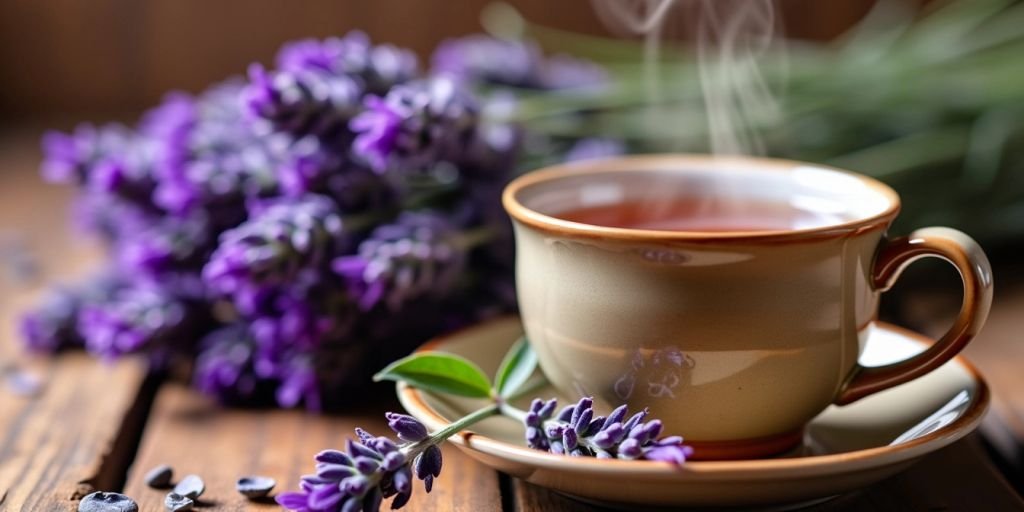Table of Contents
Lavender tea is a delightful herbal drink made from the buds of the lavender plant. Known for its calming aroma and soothing taste, this tea has been enjoyed for centuries. Beyond its pleasant flavor, lavender tea offers several health benefits and can be used in various ways, from aromatherapy to culinary recipes. Let’s explore the many advantages and uses of this fragrant beverage.
Key Takeaways
Health Benefits of Lavender Tea
Promotes Restful Sleep
Lavender tea is well-known for its calming effects, which can help improve sleep quality. Drinking lavender tea before bed can help you achieve more restful sleep by calming brain function and reducing the stress hormone cortisol. Lavender tea boosts the production of dopamine, which helps you relax and fall asleep more easily.
Reduces Anxiety and Stress
Lavender tea is often used to reduce anxiety and stress. The aromatic compounds in lavender can calm you down and activate certain parts of your brain. Studies have shown that people who drink lavender tea report feeling less anxious and more relaxed. This makes it a great option for those looking to manage stress naturally.
Alleviates Menstrual Cramps
For those who suffer from menstrual cramps, lavender tea can offer relief. The anti-inflammatory properties of lavender help soothe muscle spasms and reduce pain. Drinking a cup of lavender tea can help ease the discomfort associated with menstrual cramps.
Supports Digestive Health
Lavender tea can also support digestive health. It helps soothe digestive issues like nausea, stomach cramps, and bloating. The anti-inflammatory properties of lavender help calm irritated stomach muscles, making it easier to digest food. The scent of lavender can also stimulate the production of bile, which aids in digestion.
Lavender tea is more than just a soothing beverage; it offers a range of health benefits that can improve your overall well-being.
How to Brew the Perfect Cup of Lavender Tea
Choosing the Right Lavender
When making lavender tea, you can use either tea bags or loose flowers. Loose flowers often provide a fresher flavor and better quality. If you grow your own lavender, make sure to use organic methods to avoid chemicals. It’s also wise to grow them away from roads to prevent contamination.
Brewing Techniques
Here’s a simple recipe to get you started:
Ingredients:
Instructions:
- 1. Boil the water until it reaches a rolling boil.
- 2. Place the lavender flowers in the tea infuser and put it in a cup.
- 3. Pour the boiling water into the cup.
- 4. Let it steep for 8 to 10 minutes. The longer you steep, the stronger the flavor.
- 5. Remove the infuser and enjoy your tea. You can add honey, sugar, or lemon for extra flavor.
Enhancing Flavor with Additives
Lavender tea is naturally sweet, so you might not need to add sugar. However, if you prefer a sweeter taste, use a small amount of sugar to enhance the floral notes. You can also experiment with other additives like honey or lemon to find your perfect cup.
Brewing lavender tea is a simple yet rewarding process that allows you to enjoy its soothing aroma and flavor. Whether you use fresh flowers from your garden or pre-dried batches, you’re sure to love this calming beverage.
Lavender Tea in Aromatherapy


Historical Uses of Lavender
Lavender has been cherished for centuries for its calming and healing properties. Ancient civilizations, including the Egyptians and Romans, used lavender in their bathing rituals and as a perfume. They believed it could purify the body and mind. Lavender tea, made from the dried buds of the lavender flower, was also used to treat various ailments, from headaches to digestive issues.
Modern Aromatherapy Practices
Today, lavender remains a staple in aromatherapy. It is often used in essential oils, candles, and teas to promote relaxation and reduce stress. Lavender tea, in particular, is praised for its soothing effects. When inhaled, the aroma of lavender can help alleviate symptoms of anxiety and even an itchy throat and ear. Many people enjoy a cup of lavender tea before bed to help them unwind and prepare for a restful night’s sleep.
Benefits of Inhalation
Inhaling the scent of lavender tea can have immediate calming effects. Studies have shown that lavender can reduce heart rate and blood pressure, making it an excellent choice for those looking to manage stress. Additionally, the inhalation of lavender has been found to improve mood and cognitive performance. For those dealing with anxiety or stress, a few deep breaths of lavender tea’s aroma can provide quick relief.
Lavender tea is not just a beverage; it’s a holistic experience that engages the senses and promotes overall well-being.
Culinary Uses of Lavender Tea


Incorporating Lavender Tea in Recipes
Lavender tea can be a delightful addition to various recipes. Its earthy sweet aroma and subtle floral notes can enhance both sweet and savory dishes. You can use it to infuse syrups, bake into cakes, or even add to salad dressings for a unique twist.
Pairing Lavender Tea with Foods
Pairing lavender tea with the right foods can elevate your dining experience. Here are some great pairings:
Lavender Tea Cocktails
Lavender tea can also be used to create refreshing cocktails. Mix it with gin, vodka, or even champagne for a sophisticated drink. A lavender tea cocktail is perfect for any occasion, offering a relaxing and aromatic experience.
Lavender tea is not just for drinking; it can be a versatile ingredient in your kitchen, adding a touch of elegance and a burst of flavor to your culinary creations.
Potential Side Effects and Precautions


Possible Allergic Reactions
People who are allergic to lavender flowers or similar plants should avoid drinking lavender tea. Those sensitive to these flowers might experience an allergic reaction, which can include difficulty breathing, skin rash, and throat irritation.
Interactions with Medications
Lavender tea can interact with certain medications, especially those that affect the nervous system. Always consult your healthcare provider before adding lavender tea to your routine if you are on medication.
Recommended Dosage
Some websites suggest using lavender oil to brew tea. However, essential oils are highly concentrated and should only be used under the guidance of a licensed aromatherapist. It’s safer to use dried or fresh flower buds to ensure proper dosage.
Be cautious with lavender tea if you have a history of heart conditions, as it can potentially influence the nervous system.
Hormonal Effects
Lavender has been linked to gynecomastia—a growth in breast tissue—in prepubescent males. Stopping the use of lavender usually reverses this side effect. Experts recommend limiting lavender tea consumption for males who haven’t undergone puberty.
Pregnant women should be careful when drinking lavender tea due to its ability to mimic the estrogen hormone. It’s always best to consult your physician before consuming herbal teas when pregnant or breastfeeding.
General Precautions
Special Considerations
Lavender might cause sleepiness. Be careful if you drive or do anything that requires you to be alert. Avoid using lavender together with other herbal/health products that can also cause sleepiness.
Sourcing and Storing Lavender Tea


Where to Buy Quality Lavender Tea
When looking for quality lavender tea, it’s important to choose food grade dried lavender flowers. You can find these at specialty tea shops, health food stores, or online retailers. Always check that the lavender is labeled as safe for consumption.
Proper Storage Techniques
To keep your lavender tea fresh, store it in an airtight container. A resealable kraft bag is ideal as it preserves the freshness of the lavender flowers, allowing you to enjoy their delightful aroma and flavors for longer. Keep the container in a cool, dark place away from direct sunlight.
Shelf Life and Freshness
Lavender tea can last for up to a year if stored properly. However, for the best flavor, it’s recommended to use it within six months. Always check for any changes in color or smell before brewing to ensure it hasn’t gone bad.
Conclusion
Lavender tea is more than just a delightful drink; it’s a natural remedy with a range of health benefits. From helping you sleep better to reducing stress and inflammation, this aromatic tea has something to offer everyone. Whether you’re looking to unwind after a long day or boost your overall well-being, a cup of lavender tea might be just what you need. So why not make it a part of your daily routine and enjoy the soothing effects it brings?
Frequently Asked Questions
What is lavender tea?
Lavender tea is a type of herbal tea made from the dried buds of the lavender plant, known for its soothing aroma and potential health benefits.
How do you make lavender tea?
To make lavender tea, steep 1-2 teaspoons of dried lavender buds in hot water for about 5-10 minutes. Strain the buds before drinking.
Can lavender tea help with sleep?
Yes, lavender tea is often used to promote restful sleep. Its calming properties can help you relax and improve sleep quality.
Are there any side effects of drinking lavender tea?
Some people may experience allergic reactions or interactions with medications. It’s best to consult a doctor if you have any concerns.
Where can I buy lavender tea?
Lavender tea can be purchased at health food stores, online retailers, and some supermarkets. Look for high-quality, organic options.
How should I store lavender tea?
Store lavender tea in an airtight container in a cool, dark place to maintain its freshness and flavor.














Leave a Review